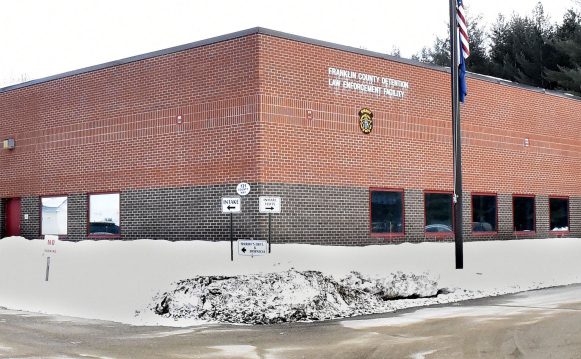FARMINGTON — State lawmakers from Franklin County will be working with Sheriff Scott Nichols to address a shortage of jail funding that Nichols said stems from the state’s failed jail consolidation plan.
The Franklin County jail faces a $323,000 funding gap in its $2.1 million budget for 2019, according to Nichols, who spoke Tuesday night to a group of lawmakers and local officials he called to the Franklin County Courthouse to talk about the importance of properly funding the county jail.
The state did away with its jail consolidation plan in 2015, but tax caps on jail funding remain in place.
Because of that, Nichols said, the Franklin County jail has relied on reserve funds to make up funding shortfalls each year since the jail resunmed full operations 2015 after functioning as a 72-hour holding facility, operating at the time on 2007 budget levels. It still has not caught up to where funding levels should be.
“Essentially we would be saying, ‘Please governor, exempt Franklin County from the portion of the law that says we can only tax at 4 percent (increases annually),” Nichols said. “Leave it up to the commissioners and the Budget Committee. It would probably be a Band-Aid rip the first year, but after that it would be back to a normal operation.”
Nichols said asking local legislators to make such a request is the best option to solve the budget gaps, but it was met initially with some pushback from those who gathered to speak with him about the issue.
“These are state laws people are breaking to get into your facility, not municipal laws,” said Farmington Town Manager Richard Davis, who said the county should pursue getting the state to contribute more in jail funding. “It’s not fair. That’s where the fight ought to be, in my opinion.”
Other officials Tuesday night also said the state should be footing more of the bill for county jails before making the request of local taxpayers, and some asked why Nichols was uninterested in collaborating with other counties on any potential legislation.
“It’s almost like an elephant in the room,” Franklin County Commissioner Charlie Webster said. “Is it the big counties don’t want this? There has to be something here. This is illogical.”
Nichols said the counties are not unified in wanting the state to end the tax caps.
“Some counties don’t want anything to do with this,” he said. “Maybe there are some others that do. Right now there’s just no appetite to take on this thing. They’ve tried it over last several years and just hit a stone wall.”
Rep. Russell Black, R-Wilton, questioned whether a bill that only addresses the tax cap issue in Franklin County would gain traction, and he urged Nichols and others to consider expanding the scope of legislation to the rest of the state.
He, as well as other lawmakers, including Rep. Tina Riley, D-Jay; and Scott Landry, D-Farmington, will be working on drafting legislation that addresses the issue from both a Franklin County and statewide perspective. Bills must be submitted by next Friday in order to be considered in the upcoming session, Russell said.
The struggle over jail funding stems from plans announced in 2007 by then-Gov. John Baldacci to consolidate the state’s county jails under the jurisdiction of a statewide Board of Corrections.
The goal was to create efficiencies in the system in part by sending inmates from overcrowded facilities to those with space.
Some jails, such as the Franklin County Jail, were changed to 72-hour holding facilities, and the board was in charge of collecting and re-distributing funds to larger jails.
But the program failed to live up to its billing, weighed down time and again by disputes over money, authority and performance.
“In a nutshell, it was not self-sustaining and it failed after eight years,” Nichols said in a letter sent earlier this month to Farmington selectmen.
In 2015, Gov. Paul LePage announced he would not fill vacancies on the board, rendering it unable to take any action and returning jails to local control.
But disbanding the board did not end tax caps imposed on the counties, and the jails continue to look to the state for help with funding.
When the Franklin County jail re-opened in 2015, it did so at the same funding level it had maintained before the consolidation — $1.6 million — even though its costs had grown.
The state pitches in some money for mandated costs, but at the same time, Nichols said Tuesday night, the funding for the jail has not caught up to its true cost. Even after state funds, he said, he starts each year at a more than $100,000 deficit.
“Where does the money come from? The only way we know how to deal with it is to dip into the jail fund balance,” he said. “It’s like a cancer eating the county funds from within.”
Rachel Ohm — 612-2368
Twitter: @rachel_ohm
Send questions/comments to the editors.




